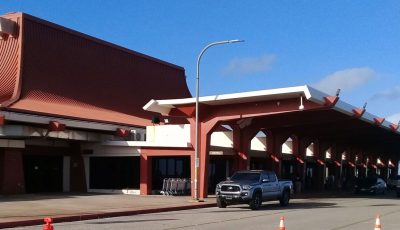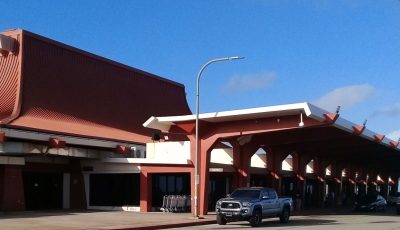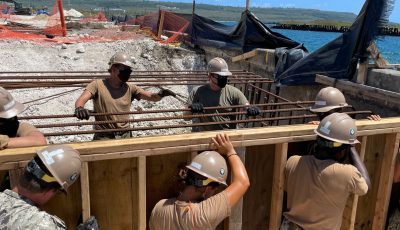GPPC sues CPA for $39M for runway rehab project delay
CPA asks court to dismiss GPPC complaint
A contractor is suing the Commonwealth Ports Authority for alleged breaches in its contract that delayed the rehabilitation of a runway at the Francisco C. Ada/Saipan International Airport, costing the company $39 million in damages.
In GPPC Inc.’s amended complaint through counsel Mark B. Hanson, the company is suing CPA for declaratory judgment and breach of contract.
GPPC asked the Superior Court to declare that the additional work being demanded by CPA is outside the scope of GPPC’s contractual obligations.
GPPC is demanding no less than $38,998,240 from CPA. The contractor also demands payment for incidental and consequential damages plus prejudgment interest and court costs.
CPA, through Robert T. Torres, asked the court to dismiss GPPC’s complaint.
Torres said that GPPC is merely attempting to sidestep the procedures and standards of review required by the Administrative Procedure Act. He alleges that the GPPC suit seeks to challenge an adverse ruling of CPA’s Appeals Committee requiring GPPC to remove and replace defective work on the runway.
Because GPPC is asking the court to overturn a decision rendered in the course of CPA’s dispute process without bringing an action for judicial review under the CAPA to do so, the court is without jurisdiction to consider the complaint, Torres said.
GPPC entered into a contract with CPA on Sept. 18, 2009, for the rehabilitation of Runway 7/25 at the Francisco C. Ada/Saipan International Airport.
The project consists of rehabilitating Runway 7/25 including milling of the existing runway, taxiway, blast bad and shoulder pavements, new asphalt concrete overlay, grooving of the new asphalt and the marking of asphalt surfaces.
The project also includes restoration of Taxiway “A,” replacement of runway edge lights and guidance signs, and the installation of lighted wind cones.
CPA contracted with Hofschneider Engineering LLC for construction management and project engineering services.
As project engineer, construction manager and designer of record for modifications to the plans and specifications during the project, Hofschneider Engineering is the agent and representative of CPA for virtually all aspects of the project.
GPPC began work on the project in January 2010. Because of a delay in necessary Federal Aviation Administration approvals, asphalt milling and paving did not actually start until Jan. 7, 2011.
Hanson stated in the complaint that, on May 19, 2011, with about 55 percent of paving work completed, HE put the project on hold in order for HE to redesign the asphalt thickness and placement plan to be used in the project. During the same period, HE also redesigned the asphalt job mix formula.
In August 2012, the redesign of the new asphalt thickness and job mix formula was approved and work re-commenced on Runway 7/25.
Hanson said from Aug. 15, 2012, to May 13, 2013, GPPC re-paved Runway 7/25, as modified and under the constant supervision of HE. Daily tests of newly placed asphalt were performed.
Hanson said that grooving of the asphalt on Runway 7/25 began approximately 30 days after each section of new asphalt was placed.
Hanson said GPPC, however, began to observe isolated instances of spalling in recently grooved areas of asphalt were occurring, but then spalling would cease over time as the asphalt had the necessary time to cure.
The lawyer said there was no other reliable indication why such spalling was occurring in the newly grooved asphalt.
GPPC then began to advocate a 90-day cure period for new asphalt prior to grooving.
Hanson said HE rejected that suggestion, insisting on a 30-day cure period and immediate grooving.
Hanson said HE began to take notice that grooved areas of Runway 7/25 and a few high stress areas of its grooved taxiways were exhibiting signs of groove failure that included groove edge crumbling and asphalt spalling.
On May 24, 2013, HE suspended the grooving of asphalt due to spalling and groove failure.
At the time, some 75 percent of grooving was completed.
HE and CPA believed the spalling related to the physical appearance of asphalt in place and demanded that GPPC remove and replace areas of asphalt the HE determined had a coarse surface texture.
In July 2013, CPA ordered GPPC to remove and replace “deficient areas” of the asphalt paving at GPPC’s own expense and to submit a construction plans.
Hanson said by March 2014, HE and CPA were ostensibly of the position that GPPC should remove and replace 100 percent of the top 2 inches of asphalt overlay of the project.
By mid-June 2014, Hanson pointed out, after extensive review and discussions of a report commissioned by CPA, it did not appear that GPPC and HE/CPA were going to resolve their differences with regard to the quality and acceptability of the asphalt in place on the project, nor on the cause of limited instances of actual defective asphalt and on the broader belief by HE (and CPA) of defects based solely on the “rough appearance” of asphalt in place.
On June 13, 2014, GPPC filed a formal dispute of HE’s position on the asphalt conditions of the project and HE’s June 3, 2014 instructions to GPPC to remove and replace the top 2 inches of the Runway 7/25 asphalt pavement.
Hanson cited that CPA’s response to the dispute was to commission another study.
On Sept. 15, 2015, CPA issued its decision on GPPC’s dispute finding GPPC is “contractually bound to remove and replace defective work.”
CPA determined that “GPPC is responsible under the contract to provide CPA with a rehabilitated runway which it has failed to do” directing GPPC, “at no cost to the CNMI government,” to comply with HE’s recommendations for removal and replacement of 100 percent of the top two inches of the asphalt, apparently concluding that 100 percent of the asphalt surface was defective.
Hanson said that GPPC has substantially performed all of its obligations under the contract documents.
Hanson said any actual and perceived defects in the asphalt work on the project are the direct result of the project designs and specifications and the decisions made by HE related to both the redesign of the asphalt mix and HE’s instructions to groove the softer asphalt in place prior to the time at which the asphalt had sufficiently cured.
Hanson pointed out that GPPC is not obligated under the contract documents to remove and replace non-defective asphalt at its own expense.
Hanson asserted that GPPC is also obligated under the contract document to remove and replace, at its own expense, defective asphalt, the defects which were design defects and/or implementation defects beyond the control of GPPC such as those defects caused by HE’s instructions to prematurely groove the soft asphalt it had designed before giving the soft asphalt a chance to adequately cure.
Hanson said CPA’s wrongful demands that GPPC perform work outside the scope of the contract has delayed completion of the project resulting in as-yet uncompensated manpower standby time, equipment standby time, increased bond and insurance costs, and other costs.
“Similarly, delays caused by HE’s redesign of the asphalt thickness, placement plan, and job mix formula and other factors also resulted in as-yet uncompensated manpower standby time, equipment standby time, increased bond and insurance costs, and other costs,” the lawyer said.
On Sept. 25, 2015, GPPC filed an appeal of CPA’s decision on its dispute with the chairman of the CPA board of directors, requesting the chairman to constitute an appeals committee under the regulations to review CPA’s decision.
On Dec. 30, 2015, the CPA Appeals Committee issued a decision denying GPPC’s appeal.
On Jan. 11, 2016, GPPC filed a request for reconsideration of that decision with the CPA Appeals Committee.
On July 15, 2016, the CPA Appeals Committee issued a decision denying GPPC’s request for reconsideration.
On Aug. 15, 2016, GPPC filed the original lawsuit against CPA.
Hanson said that on Sept. 12, 2016, CPA issued a notice of termination and default, finding GPPC in default for its refusal to perform disputed remedial work and terminating the contract.
Hanson said the work demanded of GPPC by CPA is outside the scope of the contract documents.
Hanson said by its arbitrary and capricious conduct demanding that GPPC perform work outside the scope of the contract without compensation and then terminating the contract after GPPC refused to perform work outside the scope of the contract without compensation, CPA also materially breached the duty of good faith and fair dealing.



























